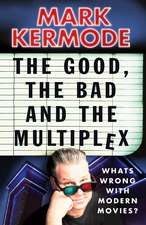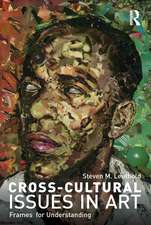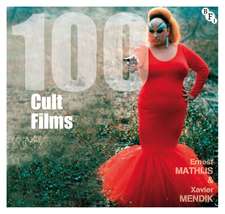Making Waves, Revised and Expanded: New Cinemas of the 1960s
Autor Geoffrey Nowell-Smithen Limba Engleză Paperback – 14 aug 2013
Preț: 186.35 lei
Preț vechi: 241.63 lei
-23% Nou
Puncte Express: 280
Preț estimativ în valută:
35.66€ • 37.50$ • 29.46£
35.66€ • 37.50$ • 29.46£
Carte tipărită la comandă
Livrare economică 17 aprilie-01 mai
Preluare comenzi: 021 569.72.76
Specificații
ISBN-13: 9781623565084
ISBN-10: 1623565081
Pagini: 264
Dimensiuni: 152 x 229 x 20 mm
Greutate: 0.41 kg
Ediția:Revised
Editura: Bloomsbury Publishing
Colecția Bloomsbury Academic
Locul publicării:New York, United States
ISBN-10: 1623565081
Pagini: 264
Dimensiuni: 152 x 229 x 20 mm
Greutate: 0.41 kg
Ediția:Revised
Editura: Bloomsbury Publishing
Colecția Bloomsbury Academic
Locul publicării:New York, United States
Caracteristici
A beautifully written introduction to the films and auteurs of the new wave cinema canon.
Notă biografică
Geoffrey Nowell-Smith is Honorary Professorial Fellow in the School of History at Queen Mary, University of London.
Cuprins
AcknowledgementsA Note on Names and Film TitlesPreface to the 2013 EditionIntroduction: What Were the Sixties? Part I: Before the Revolution1. World Cinema in the 1950s2. Criticism and Culture Part II: The New Cinemas3. New Cinemas, New Politics4. Sex and Censorship5. Outside the Studio6. Documentary, Cinéma Vérité, and the 'New American Cinema'7. Technological Innovations: Colour, Wide Screen, the Zoom Lens8. Narrative9. New Cinemas, National Cinemas Part III: Movements10. Britain: From Kitchen Sink to Swinging London11. France: From Nouvelle Vague to May '6812. Italy13. From Polish School to Czech New Wave and Beyond14. Latin America Part IV: Four Auteurs15. Young Godard16. Antonioni17. Pasolini18. OshimaConclusionFifty FilmsBibliographyIndex of Film TitlesIndex
Recenzii
Veteran film scholar Nowell-Smith (The Oxford History of World Cinema) is indeed 'making waves' as he demystifies the new cinemas of the 1960s in Europe and Latin America. He doesn't hesitate to point out that a new-wave director's use of a documentary style or black and white was because of financial rather than aesthetic reasons, or that some of the innovative techniques used (e.g. shaky camera, jump cuts, and strangely accentuated location sounds) actually reflect incompetence in overcoming difficulties in location shooting. Particularly interesting is his analysis of the change in British culture and how it affected free cinema in that country and the contrast between the diversity of new filmmaking in France and the corresponding dearth of new wave in Italy... this work distinguishes itself as an all-encompassing text on the subject, unlike others that focus on an individual country during the 1960s. Recommended for both public and academic libraries.
Its lucid and well-structured prose makes it a suitable addition to any student's reading list.
[A] brisk, sharp-witted primer on one of the most explosively creative periods of filmmaking.
A brisk refresher course for cinephiles: Nowell-Smith, editor of The Oxford History of World Cinema, zeros in on the European New Wave, and the exuberant mavericks - Godard, Antonioni, et al. - who reinvented film during the 1960s. Warning: You'll be adding Breathless, L'avventura and Mamma Roma to your Netflix queue.
The '60s saw an eruption of cine-movements around the globe. The British Free Cinema, the French and Czech New Waves and the Polish School (among others) all jostle for space as Nowell-Smith tries to pack their innovations into a small single volume. A lack of snaps and an academic tone don't exactly set the pulse racing, but at least the author admits that the Euro film bias is there because that's what he knows best.
Nowell-Smith is exacting with detail and sparing with the flabby bits that often characterize cinematic study.
Making Waves is a vivid reminder of the newness of 1960s cinema and a useful introduction to the passionate debates of a uniquely creative period.
A gratifyingly concise introduction to the likes of Bergman, Antonioni and Pasolini.
[T]he writing is always engaging and complex issues are handled with a pleasing lightness of touch, while some incisive film criticism made this reader want to see the films again.
In his new book, Making Waves, Geoffrey Nowell-Smith reviews the crests of these cinematic new waves. In sharp, clearly written prose, Nowell-Smith provides a broad context, considering not just films and filmmakers, but also the politics and culture of the era, changes in film technology, industry economics, new "mature" subject matter, and so on. In addition to this historical information, Nowell-Smith is also able to communicate vividly the ways in which so many films of this period "felt" new.Overall, in addition to being a fine review, the book is filled with insights that transform received wisdom into a subtle and textured history.
Making Waves covers a wide-ranging number of film cultures from around the world ... This book is a most suitable primer for those new to the notion of new wave cinemas [and] particularly students of film
Its lucid and well-structured prose makes it a suitable addition to any student's reading list.
[A] brisk, sharp-witted primer on one of the most explosively creative periods of filmmaking.
A brisk refresher course for cinephiles: Nowell-Smith, editor of The Oxford History of World Cinema, zeros in on the European New Wave, and the exuberant mavericks - Godard, Antonioni, et al. - who reinvented film during the 1960s. Warning: You'll be adding Breathless, L'avventura and Mamma Roma to your Netflix queue.
The '60s saw an eruption of cine-movements around the globe. The British Free Cinema, the French and Czech New Waves and the Polish School (among others) all jostle for space as Nowell-Smith tries to pack their innovations into a small single volume. A lack of snaps and an academic tone don't exactly set the pulse racing, but at least the author admits that the Euro film bias is there because that's what he knows best.
Nowell-Smith is exacting with detail and sparing with the flabby bits that often characterize cinematic study.
Making Waves is a vivid reminder of the newness of 1960s cinema and a useful introduction to the passionate debates of a uniquely creative period.
A gratifyingly concise introduction to the likes of Bergman, Antonioni and Pasolini.
[T]he writing is always engaging and complex issues are handled with a pleasing lightness of touch, while some incisive film criticism made this reader want to see the films again.
In his new book, Making Waves, Geoffrey Nowell-Smith reviews the crests of these cinematic new waves. In sharp, clearly written prose, Nowell-Smith provides a broad context, considering not just films and filmmakers, but also the politics and culture of the era, changes in film technology, industry economics, new "mature" subject matter, and so on. In addition to this historical information, Nowell-Smith is also able to communicate vividly the ways in which so many films of this period "felt" new.Overall, in addition to being a fine review, the book is filled with insights that transform received wisdom into a subtle and textured history.
Making Waves covers a wide-ranging number of film cultures from around the world ... This book is a most suitable primer for those new to the notion of new wave cinemas [and] particularly students of film














